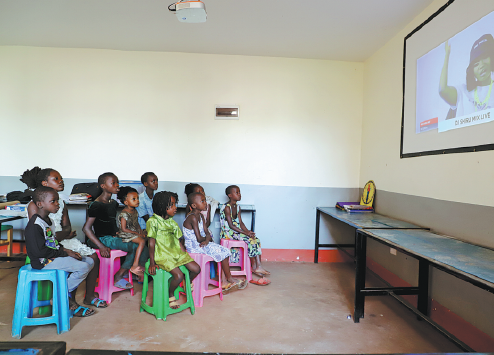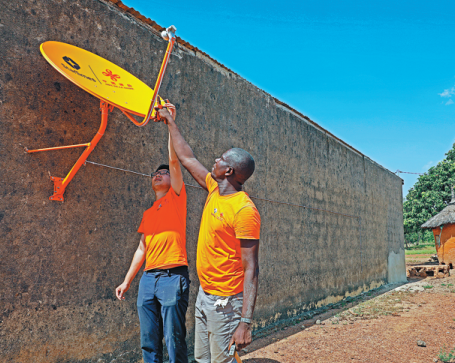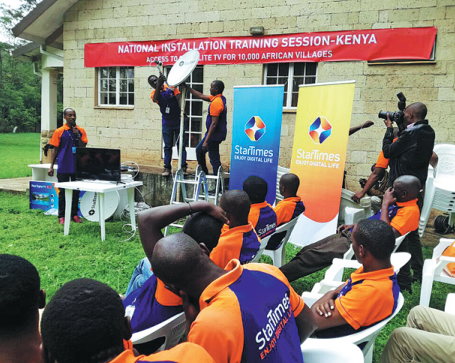In touch with the world, thanks to a little box
Satellite television, introduced as part of the Belt and Road Initiative, has transformed the lives of many Africans





Editor's Note: People-to-people exchanges are deepening the connections between countries participating in the Belt and Road Initiative. This column celebrates the efforts of those working toward a shared future.
For three years George Waweru could not watch television even though he owned a TV set because he could not afford a decoder, analog transmissions having been switched off in Kenya in February 2015.
So when Waweru, a villager in Kiambu county in the country's south, was provided with a free digital set-top box, a dish and accessories in 2018 by a Chinese company, his life changed.
"I can watch many different programs now, nationally and internationally, and it has enabled me to get informed and entertained like city dwellers," says Waweru, 48, a father of three.
Paying the equivalent of $4.50 a month, Waweru can watch dozens of programs including international news and Chinese programs such as kung fu movies, and his children watch cartoon channels.
Just a few hundred meters away, Michael Ng'ang'a, 47, and his family have also been able to access satellite TV since 2018 after being given equipment including a digital set-top box. It not only keeps him informed of what is happening outside the small county near Nairobi but also keeps his family entertained, he says.
Work can sometimes be hard to find, particularly since the COVID-19 pandemic broke out, and watching news and soccer on TV has helped relieve the stress, he says.
Like Waweru and Ng'ang'a, many other people living in remote areas in Kenya and other African countries have seen their lives change after gaining access to the outside world via satellite TV, due to the implementation of a project to connect 10,000 African villages in 25 sub-Saharan countries to satellite TV.
The project, part of the Belt and Road Initiative, which aims to improve connectivity through increased trade, economic integration, political trust and cultural exchanges, among other things, has put millions of people in touch with the outside world, says William Masy, the public relations director of StarTimes Group, a Chinese digital TV operator that is carrying out the project.
"The project has enabled locals in remote areas in Africa to have long-term and stable access to information from all over the world, narrowing the digital information gap between urban and rural areas in Africa."
By the end of August the project, which China promised during the Forum on China-Africa Cooperation in Johannesburg, South Africa, in 2015, had been completed in 8,612 villages in 20 countries, including Burundi, Ghana, Guinea, Kenya, Madagascar, Malawi, Mozambique, Rwanda, Senegal, Uganda and Zambia, he says. More than 6.5 million villagers have been connected with satellite TV.
The Belt and Road Initiative, launched almost 10 years ago, has turned from a grand concept to reality, bearing rich fruit. By now, 140 countries and more than 30 international organizations have been involved in the initiative, which has become a major international platform of collaboration, Xinhua reported.
From the BRI's inception, trade volume between China and countries involved in it exceeded $9.2 trillion by 2020, and direct investment by Chinese companies in these countries reached nearly $140 billion, says China's Central Committee for Financial and Economic Affairs on Nov 12.
Connectivity intensified
In Africa, China has intensified connectivity with the vast majority of the countries over the past eight years boosted by the BRI, with a number of flagship joint projects carried out in the continent, including railways, bridges, ports and electricity infrastructure. In addition to infrastructure development, cultural and people-to-people exchanges between China and African countries have also intensified, covering areas including student exchanges, language teaching, arts, health and agricultural assistance from China, and television such as the StarTimes project.
"Although installing satellite TV may not seem as significant a project as building bridges and roads, it can change the lives of many people, especially those in remote areas in Africa, in a more direct way," says Zhang Junqi, former chief executive officer for the StarTimes project in Kenya and Nigeria.
"Once becoming connected with TV, villagers, including children, can also get a glimpse of the outside world, have access to information and different cultures, so they get to know what the world is like, which can greatly affect their lives."
In some East African countries, including Kenya, only satellite signals have been available for TV since 2015, but usually residents can only receive a few free TV programs, Zhang says. Some satellite TV operators in Africa charge a lot for paid TV programs, which has limited satellite TV subscriptions in Kenya largely to cities, which are generally more affluent than rural areas.
In contrast, for about $5 a month a household, villagers in Kenya can receive 50 channels, including Chinese and international ones, provided by StarTimes, Zhang says.
The project was completed in Kenya in a little more than a year, in June 2018, covering 800 villages, with 20 households connected with satellite TV in each village.
Waweru's subscription costs $4.50 a month, but subscribers can pay $9 a month or $13.60 a month to receive many more channels, he says.
Waweru finds the $4.50 a little expensive in these difficult times, he says, and wishes he could watch English Premier League soccer and that there were more cartoons for his children.
Nevertheless, he says: "I am grateful that many low-income earners like me can get informed, educated and entertained due to satellite TV."
In addition to free satellite TV equipment such as dishes and digital set-top boxes provided to each household, each of the selected villages in Kenya and Nigeria was provided with two projectors powered by solar panels and two digital TV sets, Zhang says.
"These projectors were installed in places where people can gather, such as schools and entertainment centers, so people who do not have TV can also watch programs. Students can also study with the help of TV programs in class."
Grid electricity is unavailable in many villages in Africa, he says, but the projectors use electricity generated by inbuilt solar battery.
Installing satellite TV that would be available to 800 villages across Kenya in a year was a difficult task, and 100 StarTimes maintenance engineers stationed in the country spent nearly two months training nearly 2,000 local technicians how to install the equipment, Zhang says.
"I was kept busy and under great pressure when in charge of carrying out the intergovernmental project between China and Kenya back then, especially when I was working under a different environment and culture from when I was in China.
"I had to organize meetings, keep communicating with officials at various levels, coordinate between different parties and visit construction sites in villages personally."
All that hard work has amply paid off, he says.
Work appreciated
"Without going to villages to see for yourself, it's hard to imagine how poor the conditions are, and how eager villagers are for new things such as satellite TV and projectors. Many villagers who greatly appreciated our help welcomed us with traditional dancing and rituals, treating us like VIPs, and that was very touching."
Guo Ziqi, StarTimes Group's vice-president, says the satellite TV project for 10,000 African villages has greatly benefited residents in many remote areas of Africa.
"The project has enjoyed wide recognition across recipient countries, and in many countries presidents or other senior officials such as ministers have attended launch ceremonies to show their support. In some countries satellite TV used to be largely exclusive to capital cities, but now it is available in wider rural areas.
"StarTimes hopes to work with various parties both at home and abroad to produce more TV that meets Africans needs, such as agricultural training and healthcare education programs."



Today's Top News
- Xi stresses improving long-term mechanisms for cyberspace governance
- Experts share ideas on advancing human rights
- Japan PM's remarks on Taiwan send severely wrong signal
- Key steps to boost RMB's intl standing highlighted
- Sustained fight against corruption urged
- Xi calls for promotion of spirit of volunteerism


























